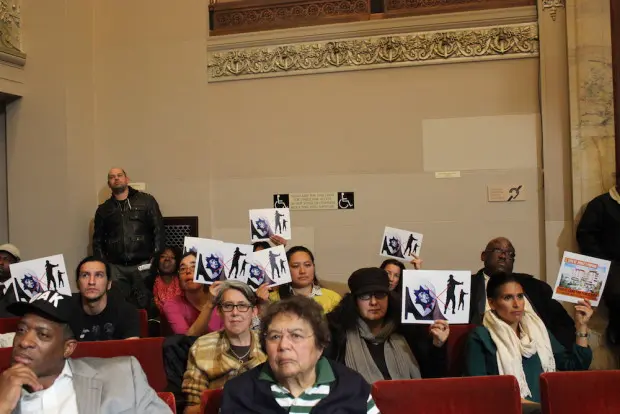Community Protesters: Amid Housing Crisis, Why is Council Funding More Police?
Dec 12, 2015
Posted in Affordable Housing, Gentrification, Housing/Foreclosures, Police-Public Safety

By Tulio Ospina
The Oakland City Council voted Tuesday evening to accept a controversial $1.875 million federal grant from the US Department of Justice that would pay 18 percent of the cost of hiring 15 additional Oakland police officers over three years.
The grant requires the city to “match” the federal funds by spending an additional $10.25 million from its general funds in order to receive the $1.875 million.
According to a city report, most of the city money will be appropriated from future budgetary cycles, taking $6.5 million from the 2017-2019 budget.
Speaking at the council meeting, Oakland Police Deputy Chief David Downing said that receiving the grant is a cheaper way of increasing staff to better do community policing.
“Nothing is better than having a walking officer on the street with direct contact with the community each and every day,” he said.
City councilmembers in support of the resolution cited increased crime and robberies in Oakland as reasons they were voting to fund hiring the 15 new officers.
But dozens of community members and housing rights activists filled City Hall to speak out against the resolution, claiming that the Oakland Police Department is already overfunded—receiving nearly half the city’s budget—and that the extra spending flies in the face of Oakland’s housing and displacement crisis.
“Police do not stop the cause of crime,” said one Oakland resident at the council meeting. “Increase people’s dignity, their sense of self-worth, their ability to attend schools, have a warm meal with their families. Good housing is a deterrent to crime.”
Other community members referred to how under-resourced and under-funded the city’s Rent Adjustment program and other anti-eviction services are, making them barely enforceable.
“We can’t spend millions of dollars on 15 officers when 1,000 residents are being displaced per month,” said Ramiro Montoya, a member of East Bay Housing Organizations.
“I experience crime in my neighborhood daily and understand that more cops in the street is not the solution. We need more services for people to improve their lives,” said Montoya.
Desley Brooks was the only councilmember to vote against the resolution, questioning why the council was not as proactive about funding housing solutions amid a housing crisis.
“We keep talking about a housing crisis and the city puts no money towards actually addressing it,” said Brooks.
“And who pays $10 million to get $1.8 million? That’s just bad math,” she said.
“Here’s proof that there’s money and, if there’s truly a housing crisis, we’re choosing not to fund it,” said Brooks. “The council isn’t being honest if they’re saying that they are concerned about a housing crisis.”
Councilmember Rebecca Kaplan was also skeptical about the city’s willingness to spend millions on hiring new police after being told for months that there was not enough funding for enforcement of tenants’ rights laws and having to scrape to fund the Housing Equity Roadmap earlier this year.
Kaplan noted that the resolution was really a budgetary adoption as opposed to a grant match.
“It feels procedurally weird to me that $10 million is to be adopted entirely outside the budgetary process,” said Kaplan. She ultimately abstained from the vote.
After the public comments section of the agenda item, attendees dropped red painted dollars of “blood money” from the balconies in protest of the resolution.
“The health of a city is about public safety. and that relies on services and people’s access to decent affordable housing, access to income and to food,” said Robbie Clark of Causa Justa: Just Cause.